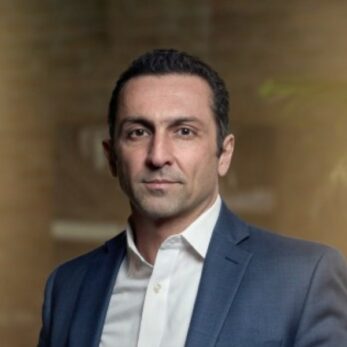Kicking off 2025? Perfect time for an SEO strategy reboot!
But smart moves always start with revisiting past lessons — so why not take a moment to reflect on how 2024 link-building year played out for SEO pros?
I would say that my year went pretty well! That being said, I did get some huge wins for clients like increasing a news site’s clicks by 36% in 3 months and getting similar data for a gaming coach client who wants to break into SEO as well.
I just crafted a creative programmatic SEO strategy that should help increase his organic traffic using his existing content on other platforms to help him. I’m definitely excited to see where 2025 will take me with SEO.
But was 2024 as positive for everyone else? In this post we’ve lined up a Q&A session where 42 link-building experts share their thoughts on the biggest questions of the year.
Check them out!
⚠️Disclaimer⚠️The stats from our guests’ responses in this post DON’T contradict the in-depth 2024 Link-Buiding Statistics survey we conducted with 113 SEO experts earlier. Instead, they bring fresh insights and personal perspectives from 42 more SEO pros who tackled some tricky questions at the end of 2024 and helped us shape this post.
🎤 Is there a clear correlation between the number of backlinks and top rankings in 2024?
Okay, since we’re big on link-building here too, let’s get the ball rolling with our take on this 😁
The deeper I dive into link-building, the more I realize — 2024 really showed us through daily practice that the link count matters less and less when it comes to hitting those top 1-3 rankings.
To show you WHY we feel this way, here is an example that should help reassure you!
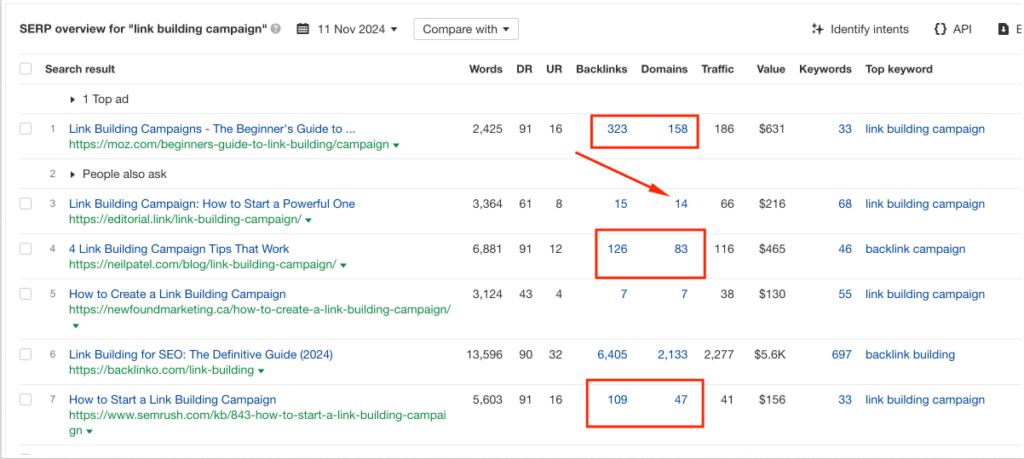
Still not convinced? Here’s another one!
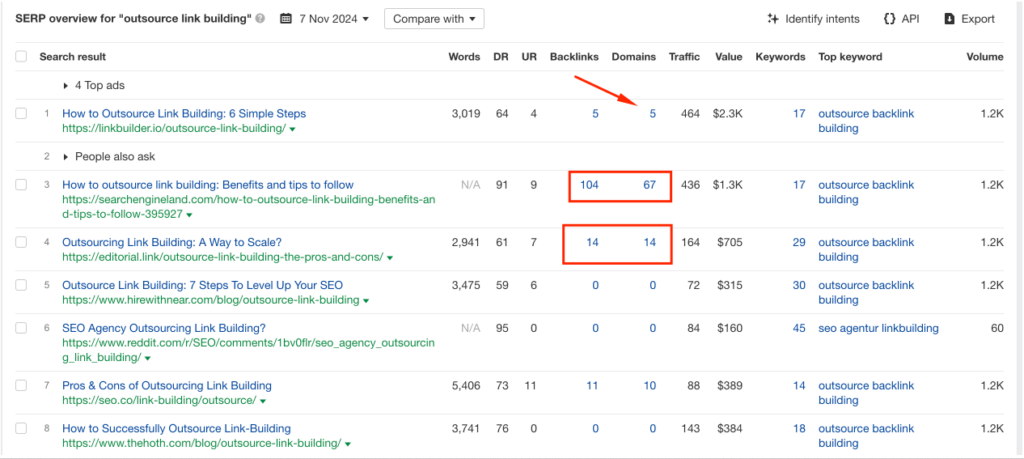
Some of the link-building experts we talked to are ALSO pretty confident that there’s no direct link between the number of links you get and hitting top rankings. For example:
No, we haven’t seen this correlation for a long time now. I personally believe that the age and length of time the link is in place is one of the strongest ranking factors and will continue to be for a long time to come.
This makes it extremely difficult for new players to enter into the market, and means they’ll need to go after longer tail keywords, even though at this stage, many of those keywords have already been acquired. This is challenging for smaller businesses who are trying to enter the market and need an even more powerful linking strategy to break through the barrier.
No, there isn’t a direct correlation between the number of backlinks and ranking position in 2024. The quality of backlinks is far more important than the quantity. Google is smart enough to recognize spammy links which can have a detrimental effect on rankings.
High-authority, relevant backlinks from reputable sites are far more valuable and will have a much stronger impact on your SEO. It’s essential to focus on earning links that add genuine value rather than chasing a quota for the amount of links generated.
To be honest, I think the number doesn’t matter anymore. I am more concerned with the quality of the website and whether it is relevant to our niche.
Back in the day, you could consistently build hundreds of links for a website, and it could potentially reach the first page of Google no matter how bad the site was. But now, that just doesn’t work anymore. It’s all about quality now.
However, not many surveyed are saying “no” to this one. Most of the link-building experts we talked to DO see a link between rankings and the number of backlinks — though with a few nuances, of course!
Yes, but quality matters more than quantity in 2024. Google rewards fewer, high-authority links that are relevant over a large volume of lower-quality links. Focusing on niche-relevant sources has become super essential.
There is indeed a correlation between the number of links and ranking positions. However, this doesn’t necessarily imply a positive correlation. When a site with a weak link profile, outdated content, or decayed design increases its link count, this can amplify signals of low authority rather than improve rankings.
In contrast, sites that steadily build high-quality links while maintaining brand demand and enhancing PageRank are often better positioned to endure future core updates.
Links remain important, I don’t know if they will never be as they give Google that external validation for relevancy and brand authoritativeness. Sometimes it’s not about the number of links in the top 3 – I’ve seen instances where pages without any links rank in the top three, above pages with strong backlink profile.
These cases are rare and happen only if the pages without links are vastly better than the competition. Google is very good at recognising poor links and I see many companies overspending on bad links that will never amount to real results. There’s a clear shift towards brand building.
Yeah, there have been several studies throughout the year, and they consistently show that backlinks still matter. I believe there was a study this year that found the top results in Google searches have an average of nearly four times more backlinks than those in the second to tenth positions.
Yes, there is still a very strong correlation with top rankings and number of quality backlinks. However, as of recently, we are seeing sites rank well without a large link profile too.
100%! I analyze SEO rankings on a daily basis running my SEO business. We manage SEO for 25+ clients and my own portfolio of 5+ websites. Backlinks continue to make a major difference in the ability for a piece of content or sales page to rank for their target keyword.
The most important factor: It’s not all just about quantity…it’s much more about quality. I’d rather have 5 high DR backlinks than 20 low DR, low quality backlinks.
Oh, yes. But there are a lot of things shifting in SEO right now, so it’s hard to say it’s because link authority begins to be passed or weighted differently.
I think it has more to do with Google’s determination to control the AI content spam that’s flooding the search results. Everyone who spent months churning out ChatGPT content is now scrambling to recover websites.
In 2024, the ranking position still exhibits a correlation with the number of links, but the quality of the links rather than their quantity is more useful. It is still critical (if not more critical than ever) to have several authoritative, relevant, and trustworthy links to increase the authority of their website.
While it is beneficial to build a large number of links, the focus should be on high-quality, relevant links.
Yes, there’s still a strong correlation between high-quality links and better ranking positions, but it’s not just about quantity. Google is placing even more emphasis on relevance and authority. A few strong links from trusted sites can make a bigger impact than a ton of mediocre ones.
There is still a correlation between backlinks and ranking positions in search engine results. Sites with a strong backlink profile outperform their competitors because quality backlinks tell search engines you’re an authority and relevant.
I get that other factors like content quality and user experience are important but my observations show that sites with more high quality links tend to rank higher. This reinforces my belief that a well planned link building strategy is a must have in any SEO campaign.
For sure! While having more links can help, what really matters now is the quality of those links. In 2024, Google has been focusing more on the relevance and authority of the sites linking back to you rather than just counting how many links you have.
👀 View the Stats!

🎤 What link-building strategy has proven to be the most effective in 2024 and why?
Advanced link-building strategies have always been a hot topic for SEOs, and this trend is set to continue beyond 2024. Consider the top choices for this year!
Outreach for guest posting is still one of the best strategies. It is time-consuming, however, getting a quality link from a site with high DA that is relevant to your niche still has a major impact on your website’s performance.
In 2024 and beyond, a blend of AI-powered outreach and data-driven content creation has proven highly effective for link acquisition. Strategies that focus on unique statistics, well-designed visuals, and tailored outreach, especially in the form of linkable assets like “USA Debt Statistics” or “Canada Eye Health Statistics,” attract consistent backlinks. These pages, updated annually, can passively enhance topical authority and organically grow PageRank with minimal ongoing effort.
I think people are getting a little bit fed up with all those duplicate boring emails asking for backlinks (I receive multiple of those every day for some of the properties I own, and they are just always terrible), so I think there are two better ways to get links. The first one, and some good agencies out there that specialize in this, is newsjacking for your clients.
The other one, which I leverage more for my clients, is the linkable assets. So, do original research with the data that you have as a business, or build little tools, like calculators, a one-purpose tool that helps your target audience make their day and work a lot easier, etc. Those attract a lot of backlinks by themselves.
The most successful type of link-building I’ve seen this year is the one that helps elevate your brand authority – digital PR, HARO – also, anything that places your site in front of a target audience that then (ideally) searches for your brand online.
Digital PR is the best link-building strategy in 2024 because it focuses on earning high-quality, natural backlinks that search engines trust. Instead of chasing easy or outdated tactics, Digital PR is all about creating content that people genuinely want to share, while building relationships with journalists.
This means the links you get are from reputable sources, which help to build you as an entity in your niche. It’s an approach that evolves with Google’s algorithms and delivers long-lasting results, making it the most reliable way to stay ahead in SEO.
Free tools and linkable assets have been highly effective. They naturally attract links making them easy targets for backlinks, especially in B2B SaaS space.
2024 has been a very topsy-turvy year for SEO, and as much as some SEOs will hate me for saying this, my strongest links and highest-ranking sites are still from PBNs. I have a few clients where I pushed them into PBNs about 7 years ago, and they continue to thrive to this day.
That being said, it depends on the type of client and the market that they’re in. There are many clients who do not want to be involved in the content generation nor bother with outreach and are more sensitive to working with aged PBNs, so an outreach strategy is the only way to build links. This is obviously slower, but the quality of the link is higher. Educating the client that you’re not building links, you’re building relationships.
Podcast link-building has been very useful. There has been an explosion in podcasts given the virality from TikTok, other short form platforms.
In 2024, I experimented with Featured and similar platforms where I could answer questions relevant to my experience and expertise for publishers that were looking for quotes. They then take the best ones and use them in their content online and send a link back to me. I’ve built 100s of backlinks using this strategy in 2024 and it’s helped boost my company’s domain rating and rankings.
Content-driven link-building and networking has proven to be the most effective for me and is likely the same for others. The reason is simple – content quality has taken precedence at the moment, because the SERPs are compromised right now. Until Google gets a handle on it, we’re going to see wild fluctuations happening across every industry and vertical.
Through personal experience and industry discussions, I’ve found content partnerships and digital PR to be the most effective link-building strategies in 2024.
It’s no longer about forging links through outdated guest posting tactics or link exchanges;instead, it’s about creating value and fostering partnerships that are mutually beneficial. For instance — collaborating with industry influencers to produce insightful content pieces not only garners high-quality links but also amplifies brand reach and credibility.
The most effective link-building strategy remains to be building relationships with authoritative websites and developing content that can be easily shared. Personalized outreach currently is the only way to garner lasting links organically.
In 2024, you should only do link-building when your website is in order and when you think it’s good enough.
That means — good UX, helpful content, etc. And then, from there, divide your link-building strategies into 60% organic digital PR links (focus on top-tier links relevant to your niche); the rest of 40% can be allotted to niche edits, .edu link building, and some guest posts.
It is important to note that these off-page articles should be valuable and not only created for link building purpose.
In 2024, content-driven link-building has been the most effective for us. Creating valuable, shareable content that naturally attracts links has consistently worked well. It not only drives organic links but also positions our clients as industry leaders.
This year I found the most effective link-building strategy is content marketing, specifically long form link-worthy content. By creating in-depth articles, guides or resources that provide real value to readers I’ve been able to attract organic links and establish myself as an authority in my niche.
Adding multimedia elements like infographics and videos has been effective in increasing shareability and engagement which amplifies my link building efforts.
PR link-building is the current trend in the link-building world that has definitely become more popular in 2024. Which is a step in the right direction away from the more spammy link insertions that are usually not that relevant, or guest posts on random blogs.
The PR link-building tactic definitely requires more strategic thinking and you actually have to do some leg work and really know the brand/business you’re working with.
The perfect link-building strategy formula is: NAPs + guest posts + links from traffic pages + own PBNs (or own web2.0 network at least) + trusted links from the niche (for lawyers these are legal directories). Then we build an anchor list like competitors and constantly build up without jerks.
We’ve seen great success with guest posting and collaborating on niche-specific content. This approach not only gives us strong, relevant backlinks but also builds relationships within the industry, which opens doors for more organic link-building opportunities down the line.
We also have created link-building magnets for our clients that have garnered links. We have also used sites like Ranking raccoon to help find relationships with other webmasters for quick link-building opportunities that have proven to be effective.
👀 View the Stats!
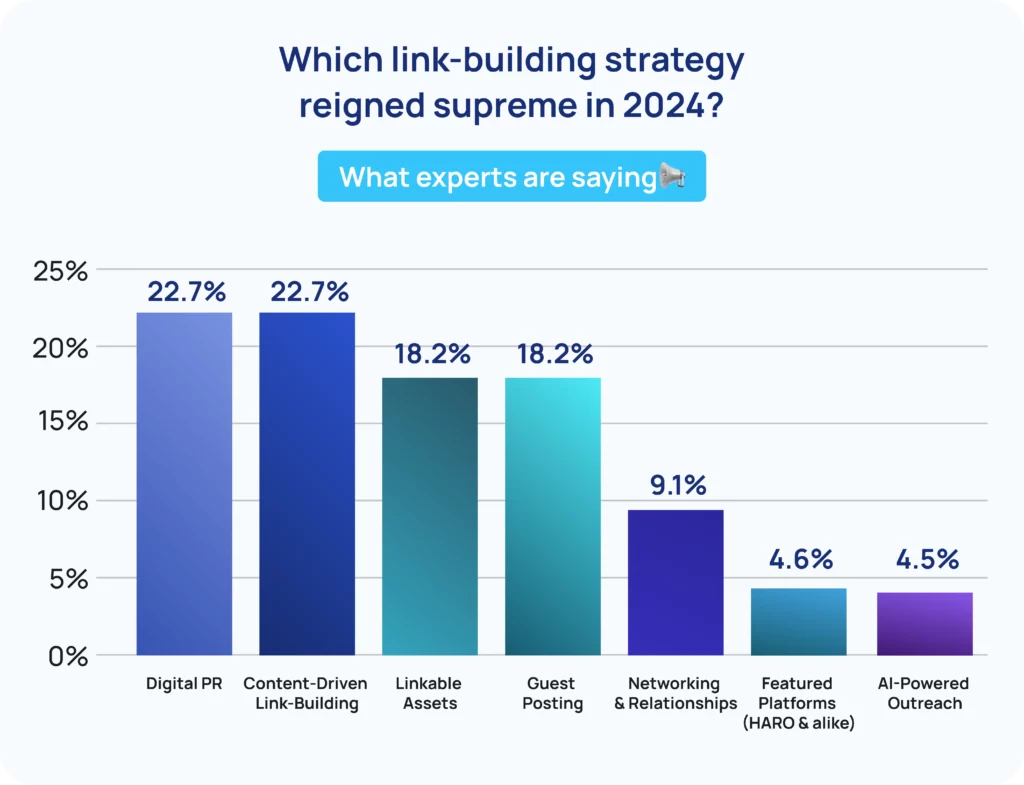
🎤 Do you consider HARO link-building effective in 2024?
⚠️ Quick Disclaimer ⚠️ Connectively (HARO) recently announced it will shut down on December 9, 2024, meaning the platform won’t be available for outreach, digital PR, or potential link-building anymore.
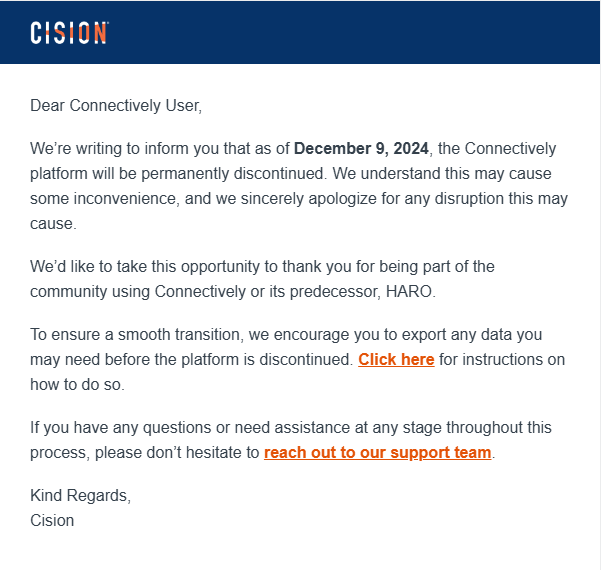
Since "HARO link-building" has become a catch-all term for general link-building outreach, regardless of the platform, when we ask this question, we’re referring to any HARO-like platforms SEOs can use for similar purposes.
Today, there are more efficient tools and platforms such as Qwoted that offer improved ways to generate high-quality backlinks through expert opinions. While HARO remains an option for some businesses, more advanced methods provide quicker and more targeted results.
HARO continues to be a staple in link-building for industries like marketing, health, technology, and beauty. It definitely remains effective due to the ongoing need for fresh, insightful content from credible sources, making it a valuable tool for acquiring high-quality links.
LOL, I just got an email the other day that they are shutting down! But there are alternatives already for some time that deliver on the same promise, tools like Featured or Qwoted. I think looking at the amount of effort you need to do to get backlinks, these (although not always) successful are the ones that take the least amount of effort.
Maybe not HARO per se since it’s now shut down, but the replacement as well as the competitors of the original HARO, absolutely!
As outreach SEOs, we are constantly trying to build as many quality links where possible, and the vetting and competitiveness of getting onto an external site ensures that the links are of higher quality and in turn, delivers better value for our clients.
Yes, HARO can still be effective but it wasn’t as effective as 2-3 years ago.
Not HARO specifically, but the type of link-building that HARO is, yes. When HARO was acquired, the experience became a bit clunkier and not as effective as it used to be. I now use sites like Featured, HelpaB2BWriter, etc.
HARO link-building has lost its glimmer since the sponsored post fiasco. It’s still relevant today, but not as much. Networking and collabs bring in more exposure these days, especially since we’ve entered the creator economy.
Sure! HARO and its current alternatives are a solid way to gain valuable media exposure and authoritative backlinks from reputable sites. In our case, HARO has consistently provided high-caliber links, proving that relevance and authority are as important as the number of links collected.
Even in 2024, using HARO (now Connectively) for link-building is still helpful in obtaining high quality links from trusted sources. But in order to make HARO really work for you, it is necessary to respond to the questions posed in a timely manner and ensure that the questions you respond to are relevant to your business and targeted audience.
Provide unique insights based on your personal experience and expertise and pitch as quickly as possible to recently posted queries; these are necessary for earning high-quality links through this platform. Link-building through HARO not only improves the quality of links but also increases the level and trust of the site in the search engines.
We don’t do HARO, but it’s still effective, especially for credibility. However, it’s become more competitive, so a targeted approach is essential for the best results.
Yes, definitely. I think HARO link-building as a concept is one of the most effective link building strategies now. Just make sure you get the most value from your effort.
Prioritize high-authority domains that can give you do-follow links. No-follow links are okay if they come from a top-tier website since you can still get referring traffic, but I’d say skip any opportunity that won’t give you a link.
HARO is still effective, but it’s more competitive now. It’s a great way to secure high-quality, authoritative links, but you have to be quick and provide real value in your responses to stand out.
I still find HARO link-building to be effective in 2024 especially for high authority backlinks from reputable publications. I’ve been getting mentions in big publications that not only boost my site’s credibility but also drive referral traffic.
The key to success with HARO for me has been crafting compelling pitches that highlight unique perspectives or data so my contributions are first-picked by website owners.
I believe HARO no longer exists, right? But the idea of responding to journalists’ requests is still a great way to get mentions and links in publications. Have we done it in 2024, yes, but only when relevant and when we actually have value to share.
Yes, if only there were more links from them😁!
Yes, HARO remains a great tool for earning high-quality backlinks, especially when we target authoritative publications. It’s been a reliable way to boost credibility and SEO.
👀 View the Stats!
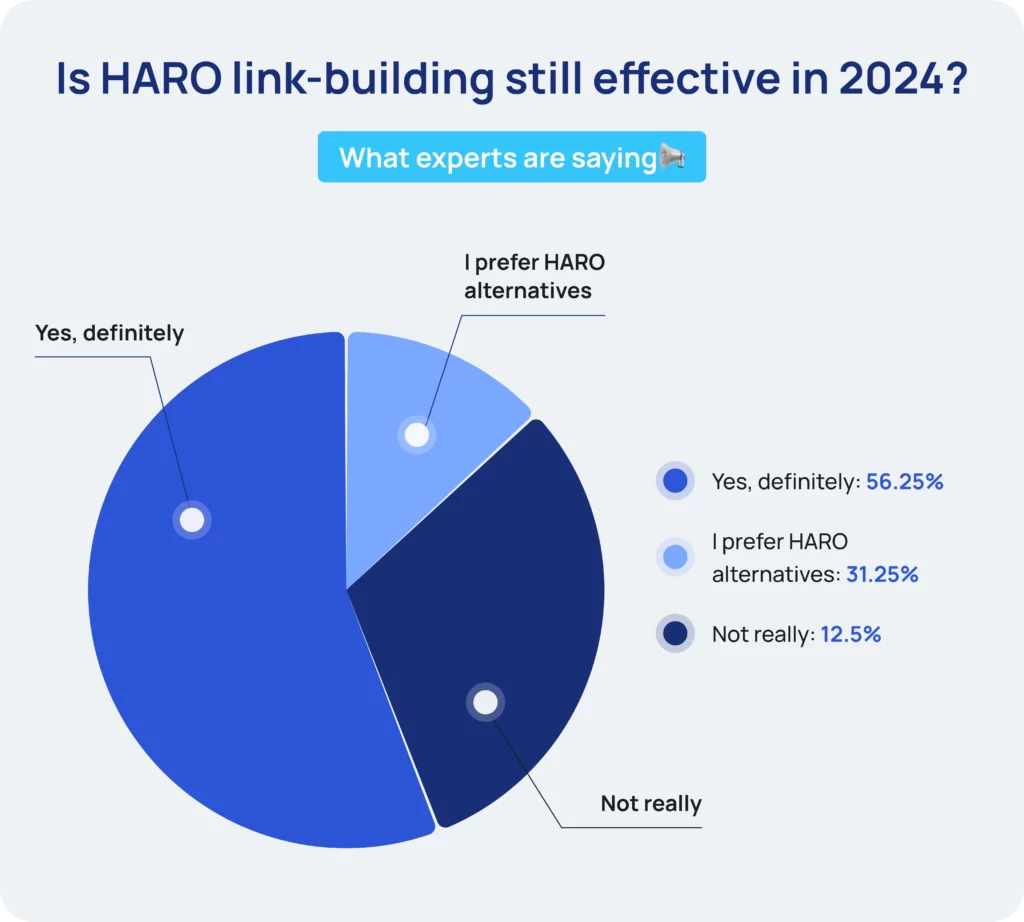
🎤 How much do you spend on link-building? How much does one link cost you on average as of 2024?
We’re keeping the tough questions coming, and link-building costs are still up for debate. Check out how our experts weighed in on this one!
💡Pro-tip! Read our related post on the average cost of links in 2024!
Client budgets for link-building in B2B range from $2,000–$3,000 per month, with high-quality links averaging $300–$400 each, depending on authority and niche relevance. Strategic investments in high-value partnerships can often yield higher returns.
Link-building budgets vary by project scope. For typical projects, a budget of $5,000 to $20,000 per month is often sufficient, while highly competitive niches like casinos can demand investments ranging from $80,000 to $120,000 per month over several years to achieve dominance.
As I’m never really buying links but am more building those linkable assets, I’m not really spending direct money on getting backlinks. If really needed for our clients, I’ve got some good partnerships for those, but it can be anywhere from $100 to $500 or more, depending on the link and the publication.
The SEO answer here is, “it depends”. Some links we simply purchase, and that can range anywhere from $50 AUD to $1500AUD for a decent link.
Sometimes, we aren’t even able to buy the link, and will need to sink some time and energy into it, which means it could cost more than $1500AUD since we’re also sinking time and manpower trying to convince the gatekeepers with our words. We try to avoid this unless it’s a really big site that would be a massive win.
With some clients we’ve been able to secure links for free with some really good linkable content. But there are also campaigns where we average $700 per link.
Link costs can range from a fixed few thousand a month for 20-30 links using the cost of an outreach specialist. Or about 200 to 300 USD per link.
For staff costs alone, we spend over £3000 a month on link building. This covers the time spent on outreach, content creation, and strategic planning by our outreach team.
Acquiring a single high-quality link can vary in cost depending on the niche, target site, and the complexity of the campaign. We will only spend money on a link if it’s a quality site that will provide genuine value for our client.
From my 25+ clients, I’d say an average for link-building per month is around $1,500 per month. Building a high quality link typically costs $200 to $300 per backlink.
Links are expensive if you pay for them. Luckily, you don’t have to – but if you do, they’re about $200-500 per link from a reputable company.
For an agency like us, we spend around $5000 per month. We need to target many keywords, and we can only do that through guest posting and link insertions.
We have an in-house team doing HARO link building — otherwise, our costs would’ve gone up since HARO link-building is really pricey. I’d say one link costs around $60 on average.
We focus more on in-house strategies, but on average, a quality link can cost anywhere from $100 to $300, depending on the site and industry.
I allocate around 28% of my SEO budget to link building each year. The cost per link can vary widely depending on the strategy I use and the quality of the links I’m after.
I typically spend between $100 to $500 per link which reflects the investment required to get quality backlinks from authoritative sources. This includes costs for outreach, content creation for guest posts and tools for tracking and analyzing link performance.
It depends on the client and the budget. We don’t actively go out and approach people for links with the offer of payment. Instead, we first identify publications that would be a good fit for a client. But, yes, there are marketplaces to find suitable publications where you can buy a guest post or sponsored article.
Sometimes these are the best options. How much does one link cost? How long is a piece of string!? Sometimes a £100 link is worth more than a £500 link, it’s all context and not always authority based. That being said, we aim to earn links, not buy them.
It depends on the niche. You need to study the competitors’ links and estimate the cost of entry.
We spend an average of $500 per month (internal price for clients with a coefficient). One link’s price depends on the link type I described above (2). For a typical guest post it is $200.
Costs vary depending on the project, but on average, we invest around $100 to $150 per quality link. It’s important to focus on value, making sure each link is relevant and impactful.
👀 View the Stats!

🎤 Do you use AI in link-building? How much does AI help you with your tasks?
2024 has truly been the year of AI breakthroughs, with ChatGPT and other generative AIs revolutionizing our daily tasks. Has link-building become easier with these advancements? Let’s see!
AI has done a fantastic job of expediting data analysis. It’s not a replacement for human outreach, but we use it for finding patterns and relevant sites.
AI helps us scale faster, but if we use it alone, we’ll have low-quality links. So, for personalized outreach and relationship building, we still need the human touch.
Yes, it’s mostly been helpful with repetitive tasks, analysis, shortlisting websites based on relevancy, writing personalized pitches, ideation and brainstorming.
AI plays a significant role in modern link-building, assisting in content creation and ensuring relevance between link sources and target sites. AI-generated outreach materials and content can improve both the quality and the relevance of backlinks.
If a link source ranks well on Google, the PageRank passed to the target is further amplified, contributing to a lasting ranking boost.
AI has become a great tool in link-building, especially for link prospecting. It excels at analyzing massive datasets to spot opportunities by identifying where competitors are getting backlinks or uncovering authoritative sites in your niche.
This means we can zero in on the right prospects much faster, freeing up time to focus on building relationships and creating content.
I don’t currently use any AI in link-building outside of helping me research backlinks from competitors with different tools.
I’m a proponent of finding ways to use AI to make operations more efficient, but I haven’t seen any tools out there specifically for backlink building that have impressed me.
I use AI to discover opportunities for backlink outreach and it saves an enormous amount of time. If you automate that with some simple Google Sheets and app scripts, then you have it on autopilot and can spend time crafting personalized emails to prospects.
AI is amazing, and we haven’t seen what it can do, yet. Mark my words – AI and automation will take over most of the workforce this year. We’re going to see a big shift in how companies operate, hire, and promote.
Yes, one of our main tools is AirOps, an AI-powered SEO tool that allows us to chain together workflows and LLMs in one. With AirOps, we have created a grid to help streamline our link-building efforts.
For relevant B2BWriter requests or Qwoted requests, we place the request in AirOps where a query extractor takes out the relevant questions and identifies the expert on our team who should answer the question.
Then, we have a set of personas based on each expert on our team — an LLM takes that persona into consideration when we use it to answer the question. From there, the real expert reviews the response, makes any key tweaks, and then we send it off.
AI has become an indispensable tool in our link-building arsenal. We leverage AI for tasks like identifying link opportunities, analyzing link quality, and even drafting outreach emails. In fact, AI now handles about 30% of our initial prospecting and data analysis.
However, AI is not a magic bullet. It’s a tool that amplifies human expertise, not replaces it. The strategic decisions, the relationship building, the creative campaigns – those still require the human touch.
AI has been a game-changer for us in identifying link opportunities and analyzing competitor backlink profiles faster. While we don’t rely on it entirely, AI helps streamline the research phase and frees up time to focus on outreach and strategy.
As of now I haven’t seen a role for AI in link-building efforts. While there’s a lot of talk about AI’s impact on different aspects of SEO my experience has not shown any transformative applications for link building.
I still rely heavily on traditional outreach and relationship building to get quality backlinks rather than automated solutions or AI driven insights.
AI is solidly handling our ongoing link-building efforts — over 50% of tasks. However, this year, Google’s algorithm updates pushed us towards more authentic content strategies, significantly reducing our reliance on manual link-building, with 70% of our links now acquired organically.
Yes, I utilize AI in link-building primarily for possible linking options and understanding competitor backlinks. AI streamlines efficiency by processing large datasets, enabling more strategic outreach.
AI is incredible as a research and data organization tool. You can reduce hours of manual research down to just a couple minutes. For example, if you guest post your ticket to backlinks, you can use the prompt: Create a list of websites that have a “write for me” or “write for us” section on their website.
Honestly, we have used AI in our link-building efforts, but we treat it as a tool, not a solution. AI is great for automating tasks like prospecting and analyzing link profiles such as things that would take a team of people hours to do manually. It helps streamline those early stages, allowing us to focus more on strategy and outreach.
That said, AI can’t fully replace the human component of link-building. Building relationships with website owners, writing personalized outreach emails, those are things AI hasn’t mastered yet, and probably never will.
AI has become very useful in link-building, especially for content research and discovery. It quickly pinpoints relevant sites and publishers, cutting out a lot of manual work. This efficiency means spending more time crafting quality outreach strategies, with AI doing the heavy lifting of finding prospects.
AI plays a significant role in link-building, especially when it comes to competitor analysis. It helps us figure out what strategies are working for others by analyzing their backlinks.
This insight allows us to either replicate their successful tactics or improve on them, making our campaigns more effective.
AI doesn’t replace the strategy, but it amplifies it, making the whole process faster, smarter, and way more efficient.
👀 View the Stats!
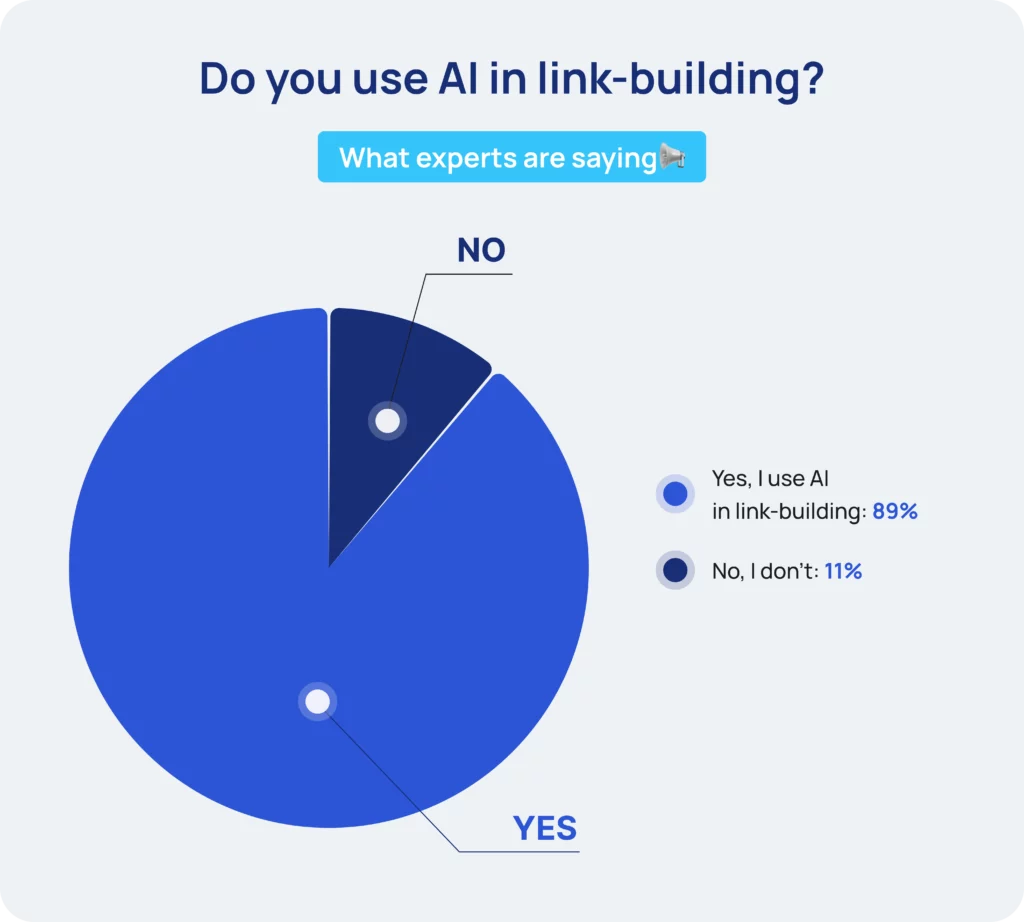
🎤 How changes in Google's algorithms affected your link-building strategies this year?
Aww, these can throw a wrench in your plans, but adjusting is key to effective SEO. We asked the experts for their take!
It hasn’t changed much. High-quality, relevant links have always been a priority. Recently, the algorithm only rewards high-quality and relevant links with traffic — sites or pages with traffic that are relevant to my linkable asset.
The only change is a greater focus on quality. This means ensuring the website has related content indexed by Google so it’s relevant and has authority to pass on.
In 2024, Google started placing emphasis on quality, rather than quantity. Now, we’ve moved towards fewer but more powerful links from authoritative sites.
Low-quality backlinks aren’t working anymore, so we’ve had to reevaluate a lot of our partnerships in order to remain ranked. Now, we have found contextual relevance and natural anchor texts to be the key.
Regarding Google’s algorithm changes, we’ve had to adapt to the increased focus on E-E-A-T — Experience, Expertise, Authority, and Trust.
This shift encourages acquiring links from credible and industry-relevant websites, enhancing a site’s perceived authority. It’s become crucial to ensure that the sources of our backlinks align with these principles to maintain and boost our clients’ search rankings.
Google’s algorithm updates, particularly those focused on link quality and relevance, have forced us to continually refine our approach. Gone are the days of mass link acquisition. Now, it’s about earning high-quality, contextually relevant links.
In response, we’ve shifted our focus to creating link-worthy content and fostering genuine relationships with industry thought leaders. It’s a more nuanced, labor-intensive approach, but it delivers sustainable results.
Changes in Google’s algorithms this year have necessitated a focus on quality over quantity in link-building strategies. Emphasizing authoritative sources and natural link profiles has become crucial for maintaining rankings.
Google certainly hasn’t made anyone’s life easy this year. Link-building with high authoritative websites became a challenge when thousands of once reputable websites suddenly ended up in the gutter.
In addition, many people were pumping out websites using AI specifically for the purpose of link-building. This further reduced the pool of high-quality sites to work with.
The recent changes in Google’s algorithms have made us even more selective in our link-building approach. It’s no longer about just securing backlinks from any website. We’ve shifted toward acquiring links from highly relevant, authoritative sources, as Google continues to place more value on content quality and contextual relevance.
Google’s algorithm updates have reinforced the importance of prioritizing quality over quantity in link building. We’ve shifted our focus to creating more in-depth, data-driven content that naturally attracts links from reputable sources.
Additionally, we’ve increased our emphasis on building genuine relationships with accounting industry thought leaders and publications, as these links tend to hold more value in the eyes of search engines.
Google’s algorithm updates have pushed us to focus on quality over quantity when it comes to links. We’re now targeting authoritative sites where the content aligns closely with our niche. It’s about building links that genuinely add value rather than just adding numbers.
This year, changes in Google’s algorithms have made it crucial to avoid spammy link tactics. Google’s gotten better at spotting those, so we’ve focused on building genuine relationships with high-quality sites. Black-hat tactics are out, and sustainable, relationship-driven strategies are in.
As Google has deprecated many websites in favor of UGC sites like Reddit and Quora, our link-building efforts have shifted towards getting links from business websites that provide a tangible product or service. We now focus on company websites and blogs where the authors apply their unique perspective and real world experience in their content pieces.
Mass produced AI content has turned content into a commodity, reducing the effect of content as a search signal. At the same time, it has amplified the importance of backlinks. Obtaining quality backlinks to our clients’ websites has never been more important than it is right now.
👀 View the Stats!

🎤 What percentage of links do you acquire organically, and how many are the result of active link-building efforts?
It's not just about the number of links, but how you get them. Flick through what our experts have to say!
💡 Pro-tip! Discover more actionable link acquisition methods inside our post!
I’d say, 10% are natural, 90% — active effort. My main niche isn’t big on naturally linking, but I have some articles with top rankings that are top-of-funnel informational pieces that become a reference for other sites and naturally gain links this way.
In terms of link acquisition, about 60% of our links are organic. These come from crafting and promoting high-quality content that naturally garners attention. The other 40% come from active strategies like forging partnerships and link exchanges, ensuring a well-rounded approach.
Comparatively, about 60% of links we acquire are organically created, reflecting the quality and relevance of our content. Conversely, the remaining 40% are a result of our proactive link-building efforts to ensure balanced and diversified growth.
Around 60% of our links come organically, with the remaining 40% from active, data-backed link-building efforts.
While we do acquire some links organically, the majority of our links come from active link-building efforts.
We estimate that around 70% of our links are the result of targeted outreach and content creation, while 30% are acquired organically through our existing content and brand presence.
In our experience, the most effective link profile is a balanced one. Roughly 60% of our clients’ links come from organic acquisition – the natural result of having outstanding content and a strong brand reputation. The other 40% comes from targeted, manual outreach and strategic partnerships.
Both are essential. Organic links provide a strong foundation, while active link building allows for strategic growth and competitive advantage.
Approximately 60% of links I acquire are organic, resulting from high-quality content and brand visibility, while about 40% stem from active link-building efforts, including outreach and guest posting.
Organic links are like diamonds in the rough. You really need to be creating evergreen or on trend content. The challenge is getting your content in front of the right people. I’d say less than 10% of links result from organic strategies if you aren’t actively pursuing this as a goal.
I’d say about 65% of the links we acquire are organic. These come from high-quality content that naturally attracts backlinks over time. The remaining 35% stems from deliberate outreach and relationship-building efforts — whether through partnerships, digital PR, or influencer collaboration.
We see a balance in our link sources — about 50% come organically as our content naturally attracts links. The other half is the result of active efforts, like targeted outreach and guest posting. This mix helps maintain a strong, diverse backlink profile.
In terms of how links are acquired, about 30% come organically, while 70% result from active link-building efforts. The intense competition in our field means we need to focus heavily on actively acquiring links instead of just waiting for them to form naturally.
As a result of the HCU in 2023, I would estimate 80% of the quality (non-spammy) links our team acquires are from active link-building efforts.
The featuring of user generated content sites in the SERPs has reduced the rankings of many of our clients — reducing traffic to their sites and making it harder to pick up backlinks organically.
👀 View the Stats!
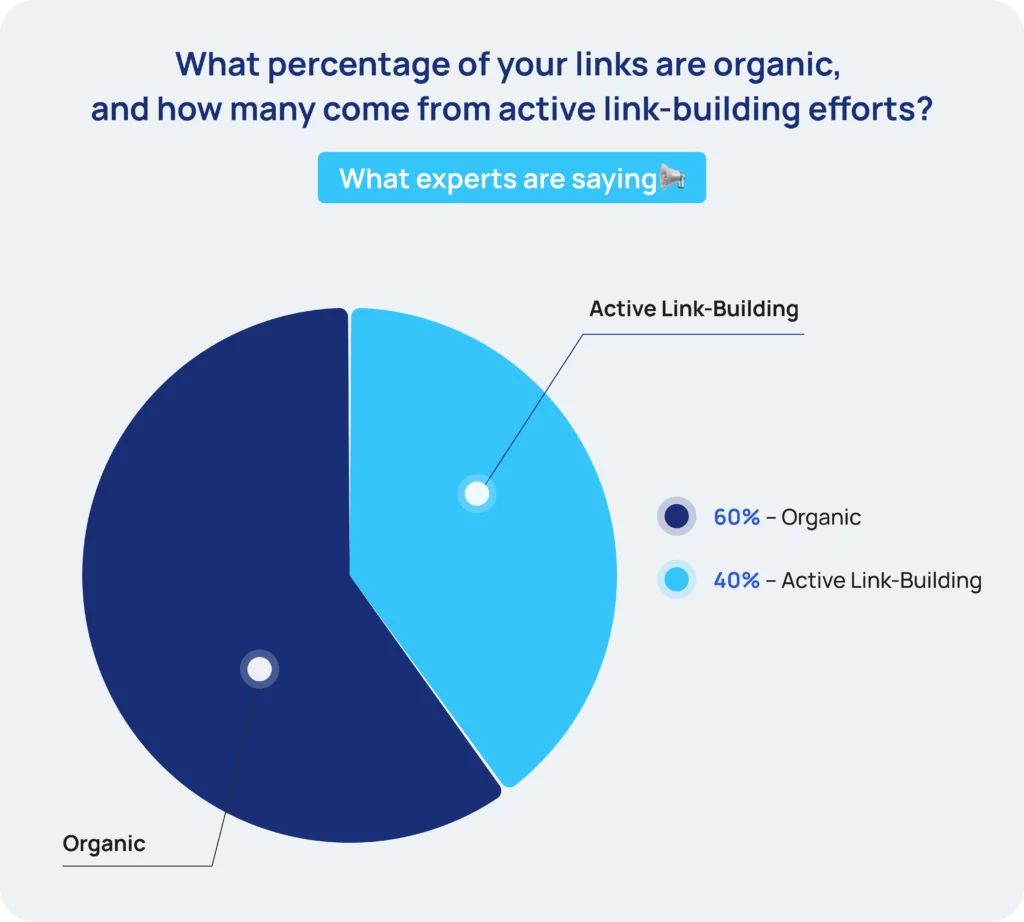
🎤 How do you see the future of link-building? What trends do you anticipate in the coming years?
Many past trends have sparked new ones, so maybe 2024 is just the beginning of something bigger ahead. Hear what the surveyed SEOs think!
It will always be an integral part of ranking in search engines; being mentioned by other publications naturally provides a popularity factor. Since the last algorithm change, though, sites that used to pass juice have lost their rankings and position, which has made the links from them much less effective.
Google will prioritize passing authority mostly from domains that have traffic. Lately, these have become large publications, which are much more difficult to gain links from depending on your niche.
Certain niches, such as travel, lifestyle, and news, will be circulated much better as they offer unique perspectives that journalists love to share with their audience.
The future of link-building lies in prioritizing relevance, authenticity, and user experience. As search engines continue to evolve, the emphasis will be on acquiring links from trusted, authoritative sources that provide genuine value to users.
I expect to see a continued shift towards content-driven link building, with a focus on creating resources that address user needs and encourage natural sharing.
Additionally, the use of AI and machine learning will likely play an increasingly significant role in identifying link opportunities and optimizing outreach efforts.
As I look ahead to the future of SEO, I see link-building expanding tremendously. One consistent tendency is the increase of “E-A-T” linkages . Google’s emphasis on credibility will make high-quality, authoritative links the ultimate goal.
But here’s the funniest part: I predict the end of “link beggars” – those annoying outreach emails that ask for links in exchange for “amazing content” that’s really just fluff. It’s like asking someone to marry you on your first date! Instead, successful link-builders will prioritize providing genuinely good content, utilizing influencer relationships, and capitalizing on the potential of community-driven link development.
At Verpex, we are already seeing the effects of E-A-T linkages on our clients’ rankings.
Looking ahead, I believe the future of link-building lies in integration and authenticity. SEO can no longer exist in a silo. The most successful strategies will be those that seamlessly integrate with content marketing, PR, and brand development.
Moreover, as users become increasingly savvy and search engines more adept at identifying manipulative tactics, authenticity will be key. The businesses that focus on building genuine, value-adding relationships will be the ones that thrive.
As of the trends to watch, I’d name brand mentions, partnerships and active user engagement for link-building.
Thinking of the future, I predict the demise of traditional link-building within five years, overtaken by AI-driven content integration that enhances user experience and value. This shift will require a radical rethink of current SEO strategies.
I anticipate that link-building will increasingly prioritize contextual relevance and authenticity. Trends may include greater emphasis on relationship-building and leveraging niche-specific content partnerships.
Links will continue to serve as a signal for search engines. Webmasters will need to become more savvy about targeting sites for relevancy. I think domain authority will be just a small piece of criteria needed to evaluate a site. Traffic, niche, content, will become more prevalent.
In my perspective, I believe link-building will transform, but it won’t disappear. AI will become more sophisticated in identifying opportunities and helping with data analysis, but human creativity and the ability to form genuine connections will still be central.
Trends like co-marketing, collaborative content, and earning editorial links through thought leadership will likely grow as we move toward a more authentic and user-focused SEO landscape.
I think the relevance of backlinks will only grow in importance. Search engines will increasingly favor links that are contextually matched to the content’s industry. Staying on top of this trend means continually refining link-building strategies to ensure relevancy and value.
The future of link-building seems to rely heavily on AI and automation. These tools will make it easier to find high-value link opportunities and streamline outreach. However, human oversight will still be crucial to ensure these efforts remain authentic and aligned with best practices.
Link-building efforts need to be focused on getting links from authentic, real world content that is clearly generated from a first person perspective. Link-building is a tedious process and unlike content generation, is highly unlikely to be automated with the help of AI anytime soon.
I predict link-building will increasingly tilt in favor of high-quality content and comprehensive user experience, outspreading from mere link acquisition. I anticipate AI technologies and advanced data-driven strategies will play a pivotal role in the SEO landscape over the coming years.
The upcoming trend is steering towards the importance of brand mentions, even if they aren’t linked. Google’s ability to recognize brand authority is advancing, suggesting that in the future, unlinked brand mentions might be just as significant as traditional backlinks for SEO success.
More AI integration is coming, but authenticity will matter more. Links that came from trusted sources will have more impact than the volume alone. The tools, surveys and data visualizations that we develop will likely grow to become a critical part of our ability to earn organic links.
👀 View the Stats!

🎤 Do you calculate the ROI of your link-building? If so, how?
If you’re putting time and money into link-building, it’s gotta pay off, right? Take a peek at how SEOs are tackling this.
We calculate the ROI of our link-building efforts by tracking referral traffic and improving organic search rankings. One of our clients saw a 25% rise in site traffic after we built high-quality backlinks through thought leadership content.
The key metric we focus on is how those links translate into conversion rates, not just traffic. For us, the real ROI comes when backlinks lead to meaningful business growth, whether leads or sales.
Yes and no, it’s not always a direct correlation between links and improved rankings, but on the whole, link-building enhances all the other efforts, so looking at sitewide or page-level improvements and how they are affecting revenue generation as a whole.
It’s really important to calculate the ROI of link-building and, here at Fluid Ideas, it’s something we do to show the value of our work to our clients.
To do this, we track the costs involved (such as content creation, outreach, and any fees) and compare them with the benefits, like increased organic traffic, conversions, and higher search rankings.
The real value comes from looking at how much additional revenue or leads can be attributed to the improved SEO performance from those links.
Yes, we use the direct traffic from those connections and their effect on our search ranks to determine the ROI of link-building.
In addition to monitoring each link’s referral traffic, conversions, and income, we also evaluate our Domain Authority growth and ranks for specific keywords. For instance, our organic traffic increased by 20% over six months after obtaining high-quality backlinks from industry sites, which enhanced lead generation.
Yes, though it’s tricky to tie link-building directly to leads or revenue. I usually evaluate the effectiveness of the link building campaign based on:
– Organic and referral traffic: I compare traffic levels to the linked pages before and after the campaign.
– Rankings improvement: I track the rankings of linked pages ( I mostly use SEMRush Position Tracking, but also monitor key queries in Google Search Console to analyze changes in Average Position).
– Domain Authority (DA): I evaluate any changes in DA about 6 months post-campaign and benchmark this against key competitors in the same industry.
We measure it by focusing on key performance indicators like improvements in organic rankings, increases in search traffic, and ultimately, revenue growth attributed to organic channels.
To ensure a clear view of ROI, we compare pre- and post-campaign data — ideally over a 90-120 day period — using tools like SEMrush, Ahrefs and Google Analytics. This approach helps us understand how well the links are impacting both visibility and conversions. While it’s often challenging to translate link building into exact dollar amounts, tracking organic traffic’s contribution to conversions gives a tangible indication of ROI.
We should, but we don’t. It is extremely difficult to calculate the ROI for link-building due to the need for tracking link efforts, assigning a value to a successful backlink, and the lag time for when a link appears.
👀 View the Stats!

🎤 What common link-building mistakes do you see from other companies and experts, and how can they be avoided?
Reflecting on past mistakes is the best way to speed up progress. Read some expert advice on what to steer clear of!
A big mistake in link-building that I have noticed a lot of companies do is ignore their ‘do follow’/’no follow’ link ratio. They just want to climb the SERP rankings fast and focus on building lots of follow links. While we want most of our backlinks to be do follow, it’s important to have a mix of both. I’d recommend a 3:1 ratio (for every 3 dofollows, we’d expect 1 nofollow). Although always keep in mind, it’s the quality and relevance of backlinks that matters the most.
Finally, (and this one may be controversial but) I also believe a big mistake is focusing your efforts on large link-building projects like guest blogging. While guest blogs are excellent for SEO, they are highly time consuming and there are other more effective (and fast) ways to obtain backlinks.
The biggest mistake I see time and time again from clients and other SEOs in the industry is building average quality backlinks at all. It’s not like it was in 2017.
Spending your time and money on building backlinks isn’t worth it 90% of the time. Even if it doesn’t penalize your site, it’s not going to help your organic search performance long term anymore.
The goal is to get RARE backlinks that are extremely relevant to your business model. Why? Because real partnerships with well known brands that have high editorial standards is difficult. Google knows this so these are what they actually reward.
It’s why more teams are shifting to earned link strategies and digital PR.
Speaking of mistakes, one big one we see is focusing on quantity over quality. Many companies still fall into the trap of acquiring tons of low-authority links, thinking they’ll boost rankings. Instead, focusing on earning a few high-quality, authoritative links is more effective. Having fewer, stronger links from reputable sources is better than dozens of weak links.
One common mistake we’ve observed is people neglecting outreach personalization. Companies often use generic templates, which results in low response rates.
We’ve found that by taking the time to craft personalized outreach based on the target site’s content, our success rate in securing backlinks increased by 40%.
A major mistake I see with link-building is companies being too eager to grab backlinks from just about any site without thinking about relevance or quality. The mindset is often, “More links, more authority,” but that’s not how it works anymore. Google’s algorithms are sophisticated enough to sniff out link schemes, especially when there’s an obvious pattern of direct link exchanges or links from low-DR, irrelevant sites.
Another pitfall is focusing on high-traffic sites that don’t resonate with your ICP. Sure, those backlinks might bring in traffic, but if it’s not the right audience, you’re left with a lot of bounces and zero conversions. It’s better to aim for quality links from sites your ICP actually visits and trusts. Those are the backlinks that will improve not just SEO but also your overall engagement and conversion rates.
To avoid these traps, make sure you’re building links with a purpose: targeting sites that both have a strong DR and align with your niche. And skip those quick wins with direct link exchanges — they’re a red flag to Google and do more harm than good in the long run. Quality over quantity, always.
A common mistake I see is focusing too much on low-quality or irrelevant links just to increase link volume. That won’t help your rankings and won’t give you a good ROI.
It’s also a mistake to neglect the relevance of the sites linking to you — authority and niche relevance matter more. To avoid these, always prioritize quality over quantity, and ensure you’re building relationships with reputable sites.
Putting quantity before quality is a typical error in link building. Many businesses try to get as many links as possible without checking their sources’ reliability, which can damage the credibility of their websites. To maximize outcomes and minimize penalties, prioritize reputable, pertinent websites that align with your sector.
One of the most common mistakes I see is buying links from spammy, low-quality sites created solely to sell backlinks. These sites tend to be littered with external links, making them look unnatural. If you check their organic traffic trends using tools like SEMRush, they often show a decline — definitely a red flag.
Another common oversight is ignoring the value of nofollow links. It may be a controversial take, but I believe Google still considers nofollow links when evaluating a site’s authority. In certain niches, such as fashion or beauty, a skewed link profile with too many dofollow links (>90%) looks unnatural. It’s common in these industries to have more nofollow links due to influencer campaigns and PR placements in major publications.
My advice: Don’t overlook nofollow links. If you can secure one for free, take it! Many miss out on converting unlinked brand mentions into links just because they might be nofollow. In my experience, those links still carry value, especially in building a more natural and diverse link profile.
We frequently see companies pursue high volumes of links without focusing on quality and relevance, which can harm their SEO more than help it.
Instead, businesses should prioritize authoritative and relevant sites, ensuring that links align with their site’s industry or audience. Additionally, overlooking search intent can derail efforts — make sure to target keywords that reflect what users genuinely want. Avoid these pitfalls by focusing on quality over quantity, relevance, and user intent for sustainable results.
👀 View the Stats!

🎤 Do you feel that link-building has become more competitive?
How do you stand out when everyone’s doing link-building? What makes it so competitive? Snag some insights from the SEOs!
Link-building has always been competitive, but today it’s more nuanced. The focus has shifted from volume to building high-quality, trust-based links that require strategic, well-targeted outreach.
I don’t think link-building is more competitive as it is smarter. Back in the day folks would exchange links or have a page dedicated to links with no regard for their relevance or topical authority.
Today sites are more aware of their associations and how they can impact their standing. This is why strategic partnerships with relevant audiences is key to earning good links that help not just with authority, but also drive traffic.
Absolutely, link-building has become more competitive than ever. With the rise of AI-generated content and the increasing importance of backlinks in search engine rankings, the landscape has become highly saturated.
According to recent statistics, almost 97% of all pages on the internet get zero organic traffic, mostly because they have zero backlinks pointing to their content. This highlights the critical role of backlinks in driving organic traffic and improving search engine visibility.
Link-building has indeed become more competitive in recent years. The increasing importance of backlinks for search engine optimization has led to a surge in link-building efforts across industries. This competition has made it more challenging to acquire high-quality backlinks and maintain a strong link profile.
I’ve witnessed the progression of link-building over recent years. Indeed, link-building has become more competitive as the digital sphere continues to proliferate. The key lies in adopting a blend of creative and data-driven strategies to stand out.
Link-building has definitely ramped up in terms of competition. With almost everyone understanding its importance for SEO, it’s harder to get high-quality links. The game has shifted toward creating genuinely valuable content that others want to link to naturally, as opposed to just farming links from anywhere.
Yes, link-building is more competitive in 2024, but it forces us to focus on quality. Everyone’s fighting for top-tier, relevant backlinks, which means you have to bring something unique to the table. Earning links through valuable, niche content has become the most reliable method.
Yes, since search engines are becoming more sophisticated and valuing high-quality, relevant content, getting backlinks is no longer about just acquiring as many as possible.
Today, it’s about earning those links by consistently producing valuable content and nurturing real relationships with trustworthy sites. As competition increases, businesses need to focus on quality, authenticity, and long-term growth.
👀 View the Stats!
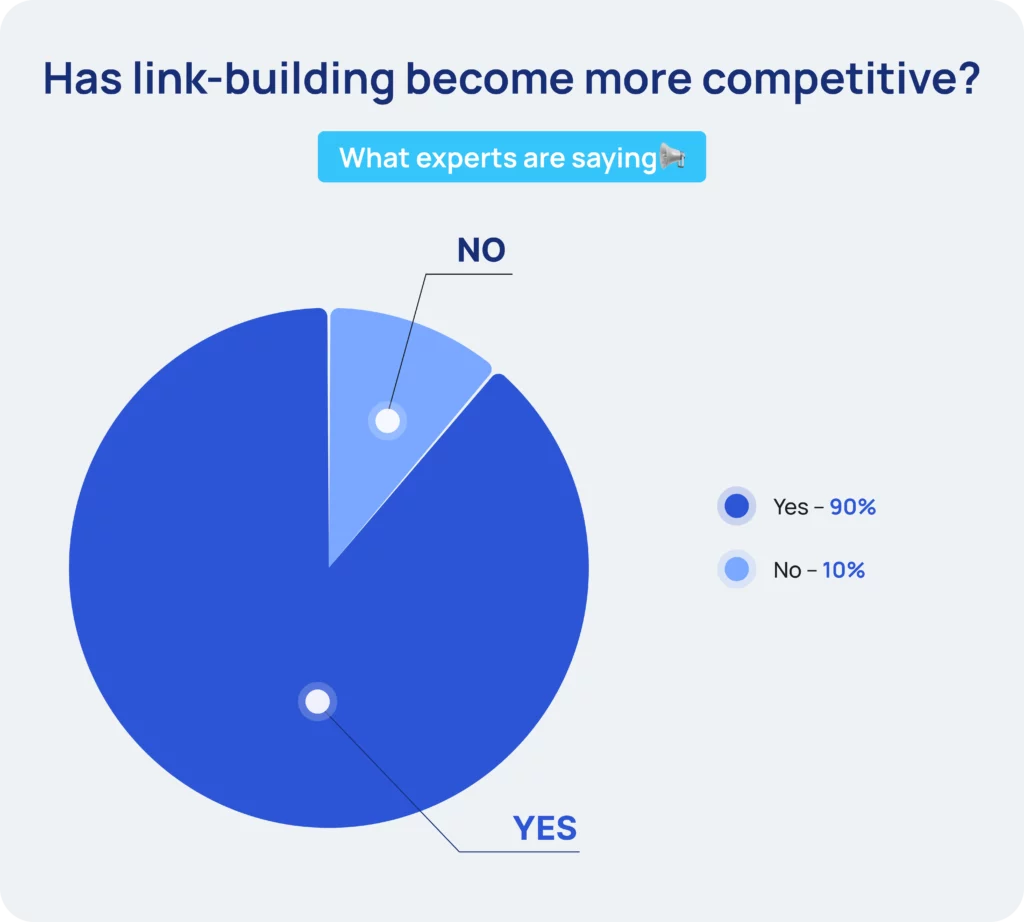
🎤 How often do you recover lost links? What percentage are you able to restore?
Lost links, lost opportunities — but is it easy to get them back? Consider the expert advice from the fellow SEOs.
💡Pro-tip! For more insights on link reclamation, read our new post!
Every quarter, I look through lost links, especially focusing on high-impact ones. For example, last year we lost an important link coming from a tech news portal that had huge traffic generation.
I personally contacted them to update their resources and present how new content could increase the value further. Well, they reinstated it. Recovery of all the links is hard, but a personal touch does wonders — on average, we are able to recover 30-40%.
We check consistently, multiple times a month, and we are sometimes able to restore them, it’s around a 10-20% success rate. The quicker we respond, the more likely it is we will restore the link.
We also prioritize high-value links, so we aim for a higher restoration rate in those cases.
We don’t usually recover lost links in the way that a 404 link building how-to might teach. Instead, we focus on replacing lower-value lost links and manually recovering high-value ones. For established brands, high-value links are essential, so we monitor them closely and perform manual outreach as needed.
I don’t spend too much time trying to recover lost links. When I look into them there is often a reason for it and one that I realize is not always worth trying to recover.
As I mentioned, I’m not a big fan of building tons of links, but rather quality links. These typically don’t disappear.
We prioritize regular link audits to identify and recover lost links. While the frequency of recovery varies depending on the specific situation, we aim to restore at least 70% of lost links through targeted outreach and relationship-building efforts.
This involves reaching out to webmasters, offering value-added content, and re-establishing connections with relevant sources.
We recognize the importance of maintaining a robust backlink profile and conduct monthly link audits to identify and recover lost links.
Our approach begins with the identification of lost links using specialized tools, followed by a thorough analysis of the reasons behind these losses. The success rate of our link restoration varies depending on specific circumstances, but on average, we successfully reclaim approximately 15-20% of our lost backlinks.
The core of our reclamation process involves conducting targeted outreach to website owners. This personalized approach allows us to address the reasons for link removal and offer solutions.
In many cases, we provide updated or improved content to encourage link restoration, demonstrating the continued value of our resources to potential linking partners.
It’s an integral part of our monthly SEO practice! Approximately 60-70% of lost links are restored.
Recovering lost links isn’t always straightforward, and the success rate can vary. Generally, about 20-30% can be restored if you catch them in time and communicate effectively with the site owner.
Tools like Ahrefs or Semrush help in tracking these, but the priority is usually building new, stronger links rather than focusing too much on recovery.
We recover about 20-25% of lost links, but it takes persistence. Regularly auditing our backlink profile helps us catch losses quickly. A polite reminder of providing updated content to the webmaster often does the trick, but not always — it’s a hit-or-miss situation, depending on the relationship you’ve built.
We make it a point to regularly monitor our backlink profile and work quickly to recover any lost links. On average, we can restore around 60-70% of lost links by reaching out to site owners and asking for reinstatement.
Sometimes, offering updated or improved content can help convince them to add the link back. Regular link audits are essential for staying on top of this and ensuring a strong backlink profile.
👀 View the Stats!

🎤 What link-building strategies do you consider ineffective in 2024?
Now, let’s talk about the strategies you should leave behind as you step into 2025. What are they? Find out from the answers!
Directory submissions and forums are much less effective than they used to be in the previous years. Also, guest posting needs to be taken much more carefully: a lot of websites that have negative ranking state (i.e. sites with a tendency of decreasing organic traffic) have the newly published guest posts not indexed or not ranking at all.
Before submitting a guest post, do go into Ahrefs or equivalent tool, filter organic keywords by the URL folder of the domain’s blog section, and select the new keywords that appeared in the last 30 days. If there are very few keywords — the guest post is not worth the effort.
From my experience, mass guest posting without proper audience targeting no longer generates the same results it once did. We once attempted this tactic and discovered that the bounce rate was too high, and engagement was low.
Also, directory submissions have not been effective because they do not typically drive quality traffic, and we now focus on organic, high-quality content placements instead.
The link-building strategy that I find ineffective in 2024 is excessive link exchanges and reciprocal linking — essentially, the “you link to me, and I’ll link to you” approach.
We used this tactic before thinking it would help strengthen our link profile and authority. However, we learned that it barely improved our rankings, and too many reciprocal links could even result in penalties.
The impact was disappointing and even damaging to our site at the time. Instead of seeing a boost in our organic rankings, our site actually dropped in visibility. Search engines picked up on the unnatural pattern of reciprocal links, and they started viewing our link profile as low-value or “spammy.”
As a result, we saw a decline in rankings and a drop in organic traffic, which affected our overall online presence and even led to a temporary penalty.
In my opinion, traditional press releases and cold outreach tactics have become less effective in 2024. With the rise of personalized and strategic link-building approaches, generic press releases and mass emails no longer yield the same results — you need more nuanced and targeted strategies.
In 2024, several link-building strategies have been deemed ineffective and potentially harmful to SEO efforts. Low-quality directory submissions, once a common practice, no longer provide value and are increasingly viewed as spam by search engines. A lot of reciprocal link exchanges can also be perceived as manipulative, undermining their effectiveness and risking penalties.
Additionally, leaving irrelevant comments with links on blogs and forums, commonly known as comment spam, is ineffective and can tarnish your credibility within the online community.
Article spinning, which involves generating multiple versions of the same content with slight variations, is another outdated technique that fails to deliver quality results.
In 2024, buying links or using link networks is likely ineffective and can be risky. Google’s algorithms are increasingly good at identifying and penalizing such tactics.
Directory submissions and mass article placements don’t yield much value either and can even harm your site’s reputation. Focus on building relationships and creating share-worthy content instead.
Buying low-quality links or link farms just doesn’t cut it anymore and can even hurt your rankings.
Instead, we maintain a focus on natural link-building techniques such as expert roundups, collaborations and influencer outreach that both bring higher quality links but also form enduring partnerships.
In 2024, link-building methods that dwell on quantity over quality simply aren’t working anymore.Mass directory submissions and bulk guest-posting on low-quality sites have lost their effectiveness.
Today’s search engines are getting better at identifying link quality, so any approach that lacks relevance or value for users tends to be flagged.
PBNs, once a popular tactic, are increasingly risky, and the benefit doesn’t outweigh the potential for penalties. It’s better to focus on gaining backlinks from respected sites where real engagement occurs.
The most ineffective link-building strategy in 2024 has to be guest posting. Website owners are inundated with requests to publish guest posts, so it is a massive waste of time to write articles then pitch them to site owners.
Most never reply, and if they do, they request payment for the post which goes against Google’s terms of service.
👀 View the Stats!

🎤 How do you deal with negative links or links from low-quality sources?
It usually means using the disavow tool or finding ways to track bad links. What do the experts have to say?
💡Pro-tip! We’ve recently posted on how to disavow backlinks in 2025, so don’t miss out on more hacks!
I’ve noticed that the disavowing of low-quality or spammy links has much less effect on the ranks. Google is getting more and more effective in spotting spammy links, so I would prioritize these tasks lower than, for example, other linkbuilding and digital PR tasks.
Unless you’re working in an extremely competitive niche where competitors are using black-hat techniques to lower the ranks of competitors.
When dealing with negative links or links from low-quality sources, we prioritize a proactive approach. We regularly monitor our backlink profile, identify potentially harmful links, and take swift action to disavow or remove them.
This involves tools like Google Search Console and Ahrefs to track our backlinks and collaborating with webmasters to resolve any issues.
Addressing negative links and low-quality sources is essential for maintaining a healthy online presence. To effectively manage these challenges, we employ a multi-faceted approach that combines proactive monitoring, strategic outreach, and content optimization.
Regular link audits form the foundation of our strategy, allowing us to identify potentially harmful links that could negatively impact our search engine rankings. When we encounter links that cannot be removed through direct outreach, we utilize Google’s tool to request that search engines disregard these problematic connections.
Our approach also includes an effective outreach program, where we contact webmasters to request the removal of low-quality or spammy links pointing to our site. This direct communication often produces positive results, as many website owners are willing to cooperate in maintaining a clean and reputable online environment.
At the same time, we focus on creating high-quality content that naturally attracts better links and diminishes the impact of any remaining low-quality ones. This content-driven strategy improves our overall link profile and adds value to users and search engines alike.
Handling negative links or low-quality sources involves monitoring tools like Google Search Console to identify them. You can attempt to contact the webmasters and request removal, but if that fails, Google’s Disavow Tool can help you tell search engines to ignore these links. It’s crucial to maintain a clean link profile to protect your rankings.
When negative or low-quality links point to a site, the first step is always to assess the impact. Google’s algorithm has improved at recognizing and discounting these links, but proactive management is still key.
I prefer disavowing the links that seem suspicious or potentially damaging and making sure our clients’ link profiles are consistently monitored. With tools like Google Search Console and Ahrefs, identifying these issues early is manageable and gives us a chance to act before they impact rankings.
Some links from low-quality sources can still be ok as long as the site isn’t seen as spammy. I have seen low DA sites still provide link juice because the website is relevant.
Again, outreach or contacting the website admin is the best way to get negative links removed if required.
We don’t worry too much about links from low-quality sources as Google has mentioned that they’re able to filter them out themselves. However, there have been occasions where competitors have tried to spam us with negative links.
When this happens, we use the ‘disavow’ tool in Google Search Console. It’s a time-consuming process, but well worth it to avoid penalties.
👀 View the Stats!
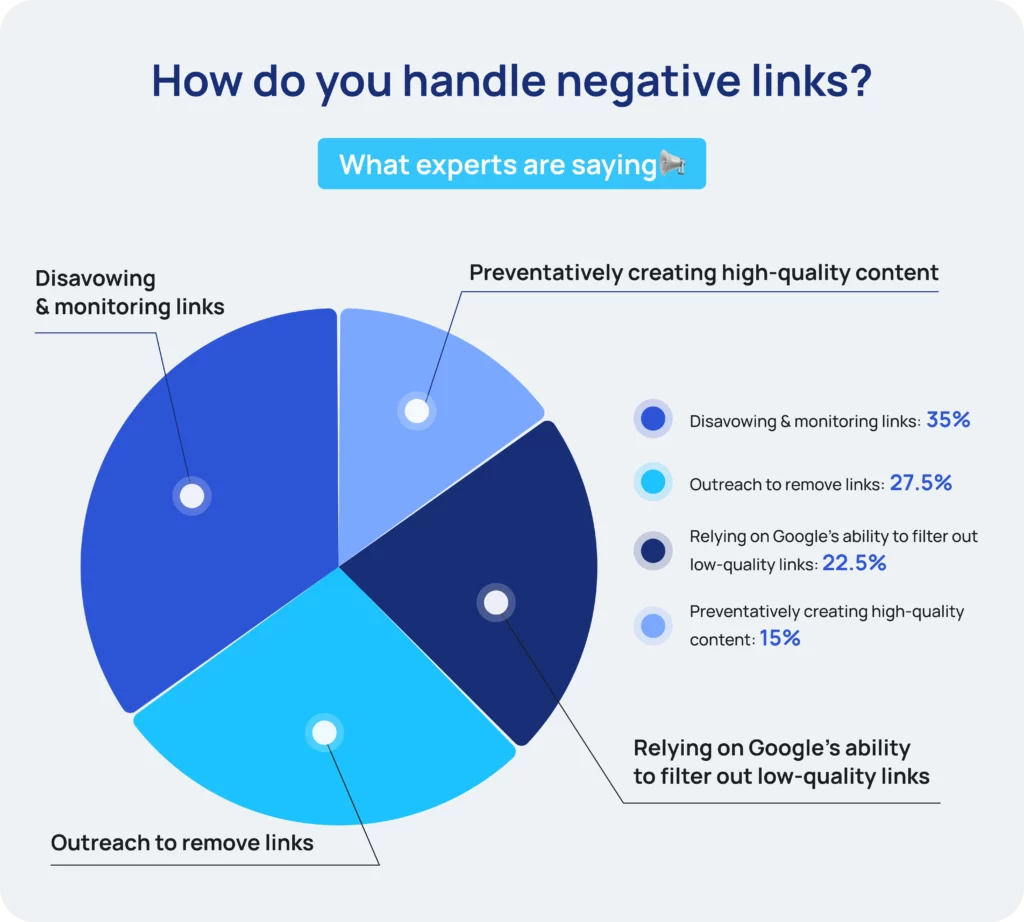
🎤 Which link-building experts do you follow? What blogs do you read? Which SEO YouTube channels do you watch?
It never hurts to learn from the best in the industry. Let’s see who the surveyed experts turn to for top advice!
💡Pro-tip! We’ve done the research and reviewed the best YouTube link-building channels of 2024 in our latest post — no need to surf the net!
And if you're ready to dive deeper into link building, don’t miss our picks for the best link-building courses of the year.
I get a lot of helpful information from Louis Smith on Linkedin (mostly ecommerce) and then Neil Patel, Brian Dean, Rand Fishkin, Aleyda Solis, and Cyrus Shepard on Instagram all post great content.
After consuming so much content from so many creators, the only link-building expert I now follow religiously is Matt Diggity. With the Google HCU a year ago, I noticed so many other ‘gurus’ pivoted so quickly from SEO to things like Pinterest, as it was a way for them to sell new courses.
Diggity is the only creator who has stayed the course on SEO, and who puts out articles and videos that have the actual steps you can follow to implement for your own website.
I frequently turn to thought leaders like Brian Dean, founder of Backlinko, and Neil Patel, whose insights are often practical and well-researched. When it comes to blogs, Ahrefs and Moz offer some of the most data-backed, actionable content in the industry.
On YouTube, I watch videos by channels like Income School and SEMrush Academy; they cover both foundational topics and advanced tactics, which is useful for staying on top of the latest changes in link building and SEO as a whole.
When it comes to link-building experts, I keep tabs on the work of Brian Dean and Neil Patel — they’re gurus in the field. For blogs, I frequent the Moz Blog and Search Engine Journal for the latest in SEO.
On YouTube, Backlinko offers great strategies, breaking things down in a very digestible way. These resources are consistently insightful and stay ahead of industry trends.
We regularly consult the Moz Blog, Ahrefs Blog, and Search Engine Journal for comprehensive insights and data-driven strategies. We also follow guidance from renowned figures like Rand Fishkin, Brian Dean, and Neil Patel, incorporating their expertise into our approach.
Additionally, we utilize YouTube channels from Ahrefs, Moz, and Search Engine Journal for practical tutorials, insightful series, and expert interviews.
I follow industry experts like Nick Zviadadze, founder of MintSEO.com, and Ben Goodey on LinkedIn. On top of that, I watch YouTube channels like Ahrefs and Moz to stay informed about the latest SEO best practices.
There are a lot of great folks out there doing some good link-building in a professional and meaningful way.
I don’t mind hearing what some individuals think, but certainly like hearing from companies like Ahrefs and Screaming Frog. Lily Ray and Glenn Gabe are pretty reliable and helpful too.
While Neil Patel and Brian Dean are great, I’ve found some lesser-known voices that dive deep into the specifics, sharing strategies that are refreshingly new and more technical. Here are a few:
– Lion Zeal (Daryl Rosser): Daryl’s channel is a go-to for unconventional tactics, especially around competitive SEO. His interviews with industry insiders often reveal the latest link-building methods used by top-performing agencies.
– Marie Haynes Consulting: Marie’s blog is invaluable for insights on link quality and recovering from negative SEO attacks. Her breakdowns are practical, technical, and often overlooked.
– Matthew Woodward: Woodward’s blog offers technical SEO experiments, especially around link-building. His “how-to” guides are some of the best when it comes to step-by-step link-building, beyond the basic outreach methods.
– LinkResearchTools Blog: This blog is perfect for in-depth articles on link detoxing, link risk management, and advanced link metrics that most SEO blogs don’t cover.
I follow Brian Dean and Marie Haynes, and enjoy Ahrefs, Moz, and Search Engine Journal blogs.
On YouTube, I recommend Ahrefs and SEMrush Academy for in-depth insights.
A link-building expert that I regularly follow is Fery Kaszoni. Also, I follow Koray Gubur — he occasionally gives out some gems in regard to linkbuilding tactics, like the ways to handle migrations from dropped domains.
👀 View the Stats!

Final Thoughts
Wow, it’s been a busy year for many SEOs, and link-building has definitely seen some changes. Some of these will carry over into 2025, so if you’ve got any SEO issues you want to fix before the new year, let the pros at Editorial.Link help you out!





















